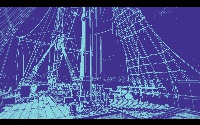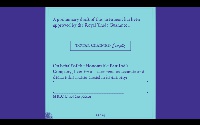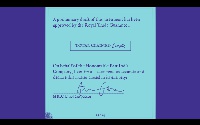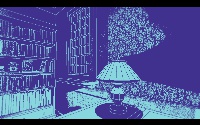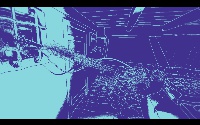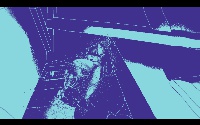Return of the Obra Dinn
Playtime: 7.5 Hours
Finished 10 March 2023.Finished the game, all chapters completed & all fates correct, fun but no interest in playing it again. Probably used minor hints (aka. looking up portraits) about 5 times total, though all but 2 were just for confirmation. Also looked up the intended fate of the guy who got dragged out of the ship by the cannon in the Doom, since I couldn't get anything to stick; not really a hint, since I understood the fate correctly but just didn't input the specific ones that were accepted. Didn't get all the achievements, since that requires a second joke playthrough to get the bad ending in a very specific and time-consuming way. I do think it's kind of funny that I needed hints for the fates of the 4 survivors - I correctly listed them as alive, but for some reason didn't make the basic connection that Morocco is in Africa; I tried the Azores and Canaries first due to their proximity...
Everything about this game is designed in a very striking style, from the monochrome visuals and pixelated shading, to the old-fashioned silent film title cards for each line of dialogue spoken. It evokes a very deliberate feeling of nostalgia; aesthetically, the game calls back to the era of very old retro PCs, and narratively, the game calls back to the 1800s or 1900s. It's definitely not a 100% commitment to either; fundamentally, the sound font and 3D nature of the experience pull it away from old PC games, and the voice work is is generally done in a modern tone. That being said, the acting is fantastic; for a game where each character gets only a handful of lines and a deathrattle, the effort in giving them personalities is clear, and the agonizing pain of each death (as most of them are) is very clearly felt through the screen. The story is quite simple as well - most simply put, the discovery that the Formosan royalty was ferrying rare shells led to a murder and attempted escape, but that attracted the attention of monsters who wished to reclaim their artifacts. The crew of the ship are overrun by undersea soldiers and a summoned kraken; in the aftermath, a few of the remaining survivors are able to escape, but the rest perish on board from an attempt at mutiny. I think the visuals work nicely at maintaing a sense of mystery in this game; if the visuals of this game were in a clear, more "realistic" style, I think the game would feel a lot more awkward to play. They're not perfect, though - sometimes, the graphical style goes a little too far in hampering visibility in some places, making the mystery simply more annoying to solve. An example that comes to mind is the steward who gets shot behind the wall on the Orlop deck; the bullet trail is almost impossible to see, and you can't get close enough to identify the shooter so you have to make a half-blind guess. Some more care really should have been taken to ensure the vital elements in each scene are clearly distinguishable, and that important characters can be identified in one way or another. With so many crew, the lack of distinguishing feeatures between characters makes the game simply more aggravating, not difficult, to play.
The actual gameplay elements and pacing are far more of a mixed bag, with somewhat of a degree of irony in the sense that the game draws you into its story through tension and mystery, just to force you to disengage from it while you go around hunting and guessing at names. It's easy to realize that the beginning of the game is extremely tedious, as the game isn't great at pacing the introduction of new characters; it also generally tends to introduce each chapter in the reverse order, starting with the last events where everyone is dead and slowly making your way to the beginning of the chapter. Even in the later chapters, having to guess at each specific name is poorly implemented, relying on degrees of stereotypes for identification (Russians are big burly dudes, for example, or the guy from New Guinea has tattoos and no shirt, and the Persian guy has a Sikh head covering?). Lots of Englishmen are completely randomized, which enhances the tedium without bettering the gameplay experience. This really should have been resolved with more interactible environments or other methods to better distinguish specific people, perhaps through rewritten dialogue, context clues, or more open & explorable environments in earlier scenes to see relationships between characters and their jobs. Having to slowly comb through each of the chapters is made significantly worse by the fact that you can't easily skip back and forth between the fate scenes, which is a terrible omission and speaks to a lack of thorough playtesting. The lack of a quick skip doesn't add anything to the atmosphere or gameplay, but forces you to check a ton of the corpses on the ship to find the specific one you're looking for; for all of the bodies that were moved post-mortem, dealing with this is nothing short of a nightmare. This easily wasted over an hour of my time playing this game.
As a final note, the "true ending" is quite anti-climactic. The game withholds the "Bargaining" chapter until the very end of the game, once everything else has been solved, but it isn't anything special once you are able to actually unlock it, despite its distinct separation from the rest of the story for no reason (note that there's arbitrarily a lock on the door in the hold on the ship, else you would be able to see the last 2 corpses). I find it really ironic that the vast majority of the game requires you to extrapolate very precise details with limited context, yet the only way anyone would not have predicted the entire Bargaining chapter is if they have no ability to do such extrapolation; some of the dialogue in Chapter 9 (Escape) very clearly alludes to events in this chapter! I think this would have actually been better if it were left completely out of the game, or more naturally integrated into the story. This feels like a pretty fitting descriptor of the game, honestly - it doesn't quite know what it wants to do in some places. It likes this degree of tension and mystery but destroys it with a "Who Am I?" game, and it requires keen deduction skills only to drop an incredibly obvious answer at your feet at the end of the day. It's an incredibly interesting game that runs out of steam before the end, and it sucks that my final memory of this game is that of disappointment.
